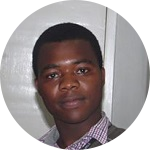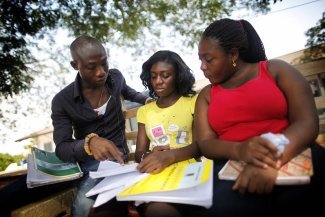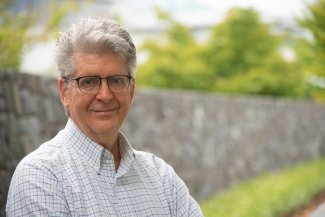
Eliya Zulu (centre) accepts a 2023 UN Population Award on behalf of the African Institute for Development Policy (AFIDEP) in recognition of its outstanding contribution to population, development and reproductive health at the United Nations Secretariat in New York on 12 July 2023.
With 70 per cent of people in sub-Saharan Africa aged under 30, Africa is the world’s youngest continent and according to some projections, by 2030, 42 per cent of all youth globally will be African. But there has long been a debate about whether this represents an unsustainable demographic trend or whether Africa’s leaders can catalyse this energy and potential to drive development across the continent and ensure peace, security and prosperity for Africans of all ages.
Dr Eliya Msiyaphazi Zulu is at the vanguard of this debate. Since studying economics and applied statistics at the University of Malawi in the 1980s, he has forged a career as a demographer, pursuing further studies, teaching and working in Malawi, Australia, the United States and Kenya. In 2010, he founded the African Institute for Development Policy (AFIDEP) in Nairobi, Kenya, which has grown to become one of the leading African research and policy institutes in this field with a second office in Lilongwe, Malawi. This July, AFIDEP was recently awarded a 2023 UN Population Award by the United Nations Population Fund (UNFPA) for its work in bridging the gap between evidence and decision-making across Africa. Shortly after the award win, Equal Times sat down with Zulu at AFIDEP’s Malawi office to discuss what it will take for Africa to harness the potential of its youth population.
What motivated you to pursue a career in demographics?
Demography was a new subject at the University of Malawi back in 1984 and I thought it had great potential to contribute towards Malawi’s and Africa’s development. I wanted to understand to what extent research informs decision-making in government to improve people’s lives and what role evidence plays in all of this.
After some years, I came to the conclusion that a lot of research was being done, but the translation of that evidence into policy-making processes was very weak. So I decided to set up the African Institute for Development Policy (AFIDEP) to focus on bridging that gap between research, policy and practice.
Can you tell us a bit more about AFIDEP?
We are a research and policy institute, but our research is mainly translational, applied research that is aimed at informing policies and programmes, particularly government policies and programmes, with the aim of improving people’s lives.
Last year we actually moved our headquarters from Nairobi to Lilongwe, partly because we felt that, as an organisation, we could do more to fill in the big gaps that exist here in Malawi in the way that policy research and policy practice interface. It’s a very, very important tool to help Africa grow.
This July, AFIDEP won a 2023 UN Population Award. What specifically did you win the award for and what contribution do you think it will make to the world of demographics?
The UNFPA selection committee said that our evidence-based approach and collaboration with governments, civil society organisations and international partners have resulted in impactful programming and positive outcomes in areas such as family planning, maternal health, adolescent sexual and reproductive health, and African population dynamics.
Our organisation has played a vital role in shaping policies and programmes that promote sustainable population growth in Africa. We’ve also played a significant role in elevating the ‘demographic dividend’ [editor’s note: the idea, in this case, that the large increase in the working age population in Africa could drive massive economic growth on the continent, with increased labour market participation and productivity] as an essential development paradigm in Africa, working in collaboration with national governments, regional intergovernmental entities, the African Union, development partners, philanthropic organisations and civil society to achieve this cross-sectoral collaboration.
Africa has the youngest population in the world and this is often presented in the West as a ’ticking time bomb’. But what and where are the opportunities?
A lot of our work at AFIDEP focuses on addressing the issue that you’ve just raised: how does Africa capitalise on its youthful population as the driving force for socio-economic transformation? The whole concept of the demographic dividend, if you read the citation in our UN award, specifically says part of the big reason AFIDEP got this award is because of the support that we’ve given African governments in putting evidence on the table to help them understand the benefits of investing in this demographic and to even start coming up with practical policies that they can implement.
There’s no question that Africa’s young working age population is a big asset for development if you can make the right investments in education and skill development. But also if the economy is reformulated so that these young people have access to livelihoods and decent work. If you do that, given where Africa is in terms of its population structure, that demographic dividend can accelerate the economic growth for Africa. That’s basically the premise.
But, if you don’t make those investments – in education, in health, and so on – if you don’t do that, if you don’t improve skill development, if you don’t create ample jobs, then it really could be a ticking bomb.
What needs to happen now?
I think African countries need to do their part. We need to prioritise investments in developing our human capital, because that’s our biggest resource. Africa is the only continent whose population will continue growing throughout the rest of this century. In the other regions of the world, populations will have stabilised or they will start falling. For instance, Africa now has a population of about 1.5 billion people and by 2050 it will have about 5 billion people. By 2070, 1 in 3 people in the world will be African.
The question is: can the world ignore Africa? The fact that other regions don’t have youthful populations means that Africa has an opportunity to actually help address labour shortages elsewhere and the rest of the world will have Africa’s young people to go and contribute to development. But that can only happen if the African population is well educated and skilled. And this is not currently happening to the level that it should be.
But at the end of the day, the biggest resource the continent has is its people. I mean, look at some of the countries that have exported a lot of labour. We used to call it a ‘brain drain’ before, right? But now there’s a recognition that you can have mutually reinforcing labour transfers between our countries in the South and in the North. If you look at Kenya, its diaspora brings back more money than all its donors combined. And I think a country like Malawi needs to invest to reach that level. It shouldn’t just be people going to work as gardeners in South Africa or domestic workers in the Middle East. A country like Malawi should be in a situation where some of its engineers are migrating to compete for the best jobs out there. But you need a skilled and educated population to do that.
In terms of workforce and skill transfers, how can the continent work with the Global North to achieve this?
When you talk about the partnership within Africa and the international community, for me, I challenge our western partners and say it’s also your responsibility to help develop this human capital in Africa. Not only will that help to make sure that there’s no civil strife in Africa and that you don’t have a lot of African people dying at your borders while escaping poverty, it will also help create more opportunities within Africa. Also when you have labour shortages, you can then tap on the African youth to come and help your own countries.
How can the youth on the continent have a seat at the table for meaningful development on the continent?
Africa’s youth should be more involved in decision-making. They should have a seat at the table. But you know, part of the challenge is: are the youth empowered enough. Is the education system really helping to develop skilled young leaders and critical thinkers, or is it just teaching young people to pass exams?
I mean, we talk about Agenda 2063 [the African Union blueprint for the socio-economic transformation of the continent] its focus on mindset shift. But where is that happening? You have to develop the youth for them to actually own and drive the development agenda. So for me, it is not only important to involve young people, but they have to take charge and make their demands.
For example, young people are the biggest block of voters but how do they behave in elections? Are they going to be swayed by ethnic considerations? Are they choosing leaders because of where they come from or are they choosing leaders who can prioritise the agendas of young Africans?
So the empowerment of youth is very, very critical. The future of Africa lies in its population. The question is, how do we turn this youthful population into an engine for socio economic transformation? It is going to take a lot. It’s not just one intervention, it’s a collection of a lot of things, some of which we have been talking about here. But I think it’s doable.












